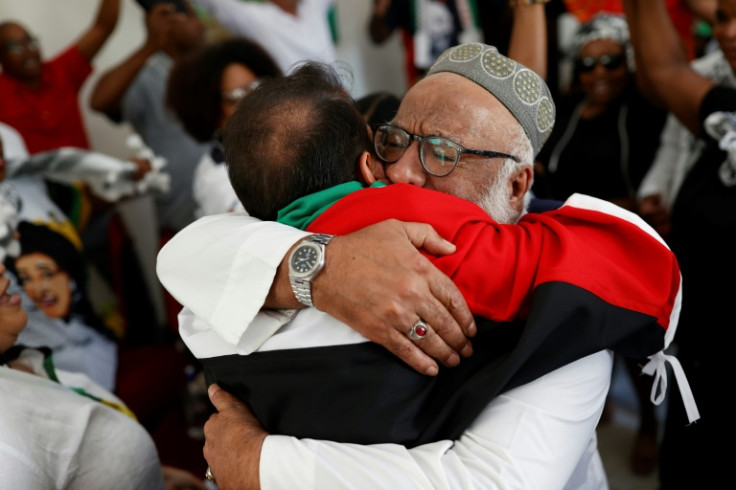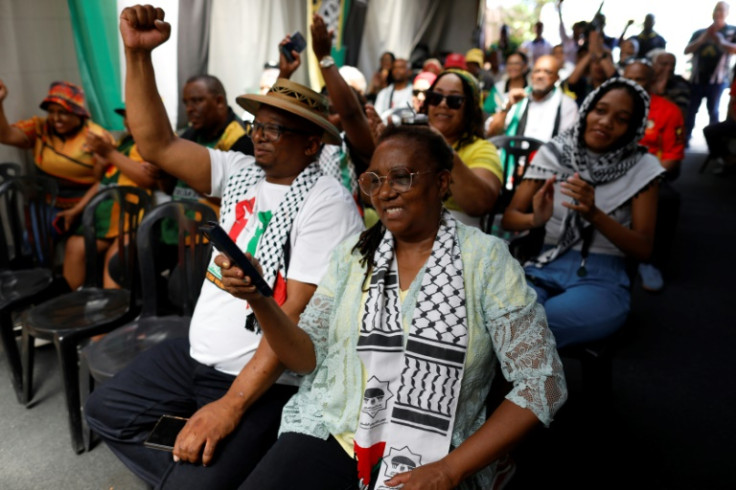South Africa Hails 'Decisive Victory' At UN Court

South Africa on Friday hailed a ruling by the United Nations' top court that Israel should do everything it can to prevent any acts of genocide in Gaza, with President Cyril Ramaphosa saying he hoped it would lead to a ceasefire.
The International Court of Justice (ICJ) in The Hague had earlier handed down its first judgment in a landmark case brought by Pretoria, that also ordered Israel to allow humanitarian access to the Palestinian territory.
"Today, Israel stands before the international community, its crimes against the Palestinians laid bare," Ramaphosa said in a televised address to the nation.
"We expect Israel as a self-proclaimed democracy and a state that respects the rule of law to abide by the measures handed down."
South Africa has accused Israel of breaching the 1948 UN Genocide Convention -- set up in the aftermath of World War II and the Holocaust -- during its military campaign in Gaza, sparked by the October 7 attacks by Hamas.
The court did not pass judgment on whether or not Israel is actually committing genocide but handed down emergency orders while it considers the wider accusation -- a process that is likely to take years.
South Africa's ministry of foreign affairs welcomed the ruling as "a decisive victory for the international rule of law and a significant milestone in the search for justice for the Palestinian people".
Given the "serious risk of genocide" other countries should now cease funding and facilitating Israel's military actions, it added.
Ramaphosa and the top brass of the ruling African National Congress party erupted in cheers, singing and dancing after judges read the order.
The ANC's National Executive Committee suspended a meeting to watch a broadcast from the court, and live footage from the event showed senior party and government figures celebrating.
Pretoria has long been a vocal supporter of the Palestinian cause, with the ANC party often linking it to its own struggle against apartheid.
The court "has vindicated us", Ramaphosa said.
"Some have told us that we should mind our own business and not get involved in the affairs of other countries. Others have said it was not our place," he said.
"And yet it is very much our place, as people who know too well the pain of dispossession, discrimination, state-sponsored violence," he said, referring to life under South Africa's former apartheid regime.
The case, and their government's involvement in it, has also generated public interest in South Africa, where many have sympathy for the Palestinian quest for statehood.
In Cape Town and Pretoria, AFP reporters found people gathering to watch the ruling, which was carried in full on state television.
As the ICJ judge announced the provisional measures, applause erupted among a diverse crowd of about 30 gathered in a community centre in Cape Town, some wearing earrings and colours in support of Palestine.
"We are discussing the extent to which it can have an impact... For now it is a step in the right direction," said medical student Kwezi Zwane, 24, as attendees embraced and commented on the ruling.
The ICJ's rulings are binding on all parties but it has no mechanism to enforce them. Sometimes they are completely ignored.
Yet, Ramaphosa said he hoped the decision will not only be implemented but also lead to a renewed diplomatic push to end the fighting.
"There should now be a more concerted effort towards a ceasefire and negotiations should commence on a permanent two state solution, to enable Israel and Palestine to live side by side as independent states," he said.
The October 7 Hamas attack resulted in the death of around 1,140 people in Israel, most of them civilians, according to an AFP tally based on official Israeli figures.
At least 26,083 Palestinians, around 70 percent of them women, young children and adolescents, have been killed in the Gaza Strip in Israeli bombardments and ground offensive since then, according to the Hamas government's health ministry.

© Copyright AFP 2025. All rights reserved.





















